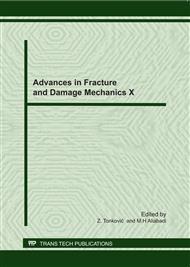p.541
p.545
p.549
p.553
p.557
p.561
p.565
p.569
p.573
A Methodological Approach to the Tolerance Problems during the Assembly Process of Deformable Bodies
Abstract:
The variations in shape compared to the initial project affect the performance and the appearance of any mechanical assembly. There are many commercial software that allow to conduct an analysis of tolerances but most of these are based on the assumption that the elements analyzed are rigid. This assumption is not found in many industrial processes. This is the typical case of the automotive industry, which widely uses assemblies of sheet metal elements, which are flexible. The major concern is how much variation (the output) of the assembly will be, as “staked-up” from possible sources of variation (the input). The sources of variation in the assembly process include parts variation, tooling variation, and their interactions. For clarity, only part variation is considered as the input in this paper. The present work aims to perform analyses of tolerances in presence of flexible elements; the analyses involve the finite element method.
Info:
Periodical:
Pages:
557-560
Citation:
Online since:
September 2011
Authors:
Keywords:
Price:
Сopyright:
© 2012 Trans Tech Publications Ltd. All Rights Reserved
Share:
Citation:


